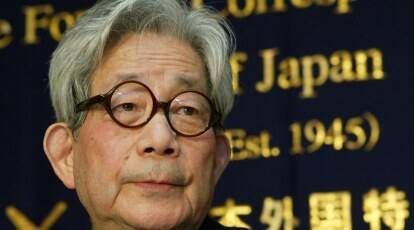TOKYO (AP) — Nobel literature laureate Kenzaburo Oe, whose darkly poetic novels were built from his childhood memories during Japan’s postwar occupation and from being the parent of a disabled son, has died. He was 88.
His publisher, Kodansha Ltd., said in a statement Monday that Oe had died of old age on March 3. The publisher did not give further details about his death and said his funeral was held by his family.
Read More:-North Korea decides on war deterrence measures, KCNA says
Oe in 1994 became the second Japanese author awarded the Nobel Prize in Literature.
The Swedish Academy cited the author for his works of fiction, in which “poetic force creates an imagined world where life and myth condense to form a disconcerting picture of the human predicament today.”
His most searing works were influenced by the birth of Oe’s mentally disabled son in 1963.
“A Personal Matter,” published a year later, is the story of a father coming to terms through darkness and pain with the birth of a brain-damaged son. Several of his later works have a damaged or deformed child with symbolic significance, with the stories and characters evolving and maturing as Oe’s son aged.

Hikari Oe had a cranial deformity at birth that caused mental disability. He has a limited ability to speak and read but has become a musical composer whose works have been performed and recorded on albums.
The only other Japanese to win a Nobel in literature was Yasunari Kawabata in 1968.
Despite the outpouring of national pride over Oe’s win, his principal literary themes evoke deep unease here. A boy of 10 when World War II ended, Oe came of age during the American occupation.
Also Read- 7 dead in shooting at a Jehovah’s Witness hall in Germany

“The humiliation took a firm grip on him and has colored much of his work. He himself describes his writing as a way of exorcising demons,” the Swedish Academy said.
Childhood wartime memories strongly colored the story that marked Oe’s literary debut, “The Catch,” about a rural boy’s experiences with an American pilot shot down over his village.
Published in 1958, when Oe was still a university student, the story won Japan’s prestigious Akutagawa prize for new writers.
Also Read– Chinese President Xi Jinping issues rare rebuke of US for ‘suppression against us’
Oe, the third of seven children, was born Jan. 31, 1935, in a village on Japan’s southern island of Shikoku. At the University of Tokyo, he studied French literature and began writing plays.
The academy noted that Oe’s work has been strongly influenced by Western writers, including Dante, Poe, Rabelais, Balzac, Eliot and Sartre.
But even with those influences, Oe brought an Asian sensibility to bear.
In 2021, thousands of pages of his handwritten manuscripts and other works were sent to be archived at the University of Tokyo.





































